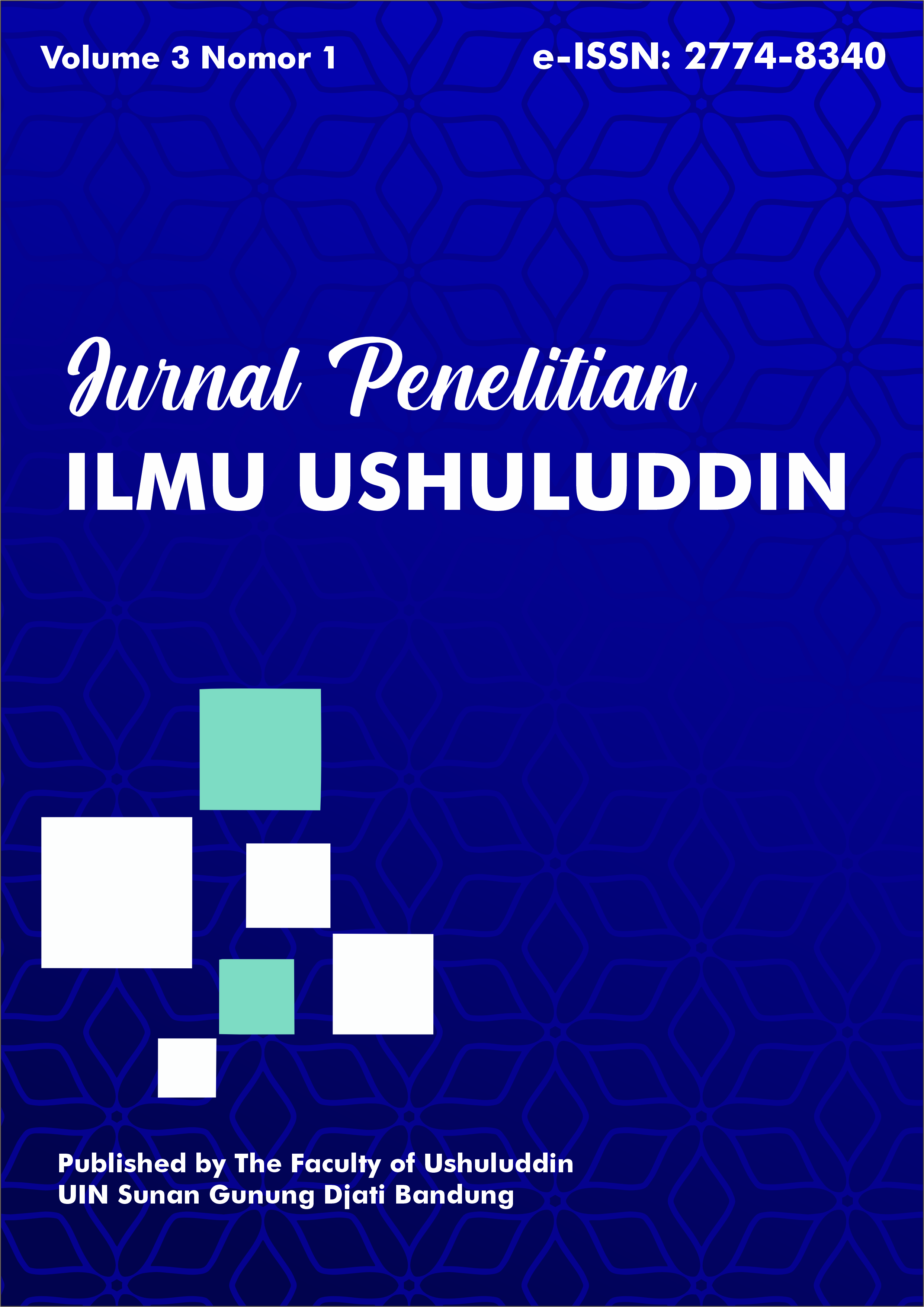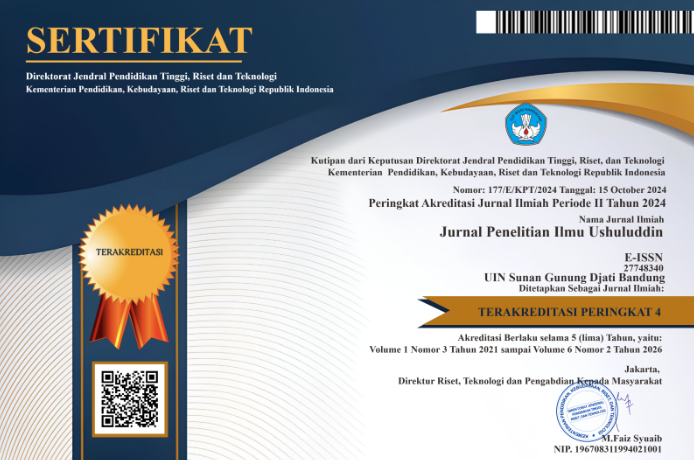Kinship Care dalam Keluarga ‘Imran: Kajian Hermeneutika Wilhelm Dilthey pada Surat Ali ‘Imran Ayat 37 dan 44
DOI:
https://doi.org/10.15575/jpiu.38662Keywords:
Ali 'Imran, Hermeneutics, Kinship Care, Wilhelm DiltheyAbstract
Kinship Care is a form of childcare by close relatives such as grandparents, aunts, uncles, or siblings when biological parents cannot fulfill their parenting responsibilities. In Indonesia, Kinship Care often arises in the context of poverty, migration, parental death, or the inability of parents to care for their children for various reasons, including death, illness, or legal issues. This research is a desk study using Wilhelm Dilthey's hermeneutic analysis method to explore three aspects, namely Erlebnis (experience), Ausdruck (expression), and Verstehen (understanding), in Surah Ali 'Imran verses 37 and 44. The results of this study conclude that in the Kinship Care pattern, Zakariya has four patterns in caring for Maryam, security and support, space for children, financial security, dialogue and appreciation for children. Then, suggestions for further research related to Kinship Care studies to explore broader patterns using different hermeneutical theories and different figures in the Qur'an can also be taken in relevance to different contexts so that they can reach ideal patterns for Kinship Care studies.References
Agama, T. T. D. (2019). Tafsir Al-Qur’an Kementerian Agama. Jakarta: Lajnah Pentashih Mushaf.
Al-Khazin, M. I. (2014). Tafsir Al-Khazin Lubab At-Ta’wil Fi Ma’ani At-Tanzil (M. ’A. Syahin, Ed.). Beirut: Maktabah Syamilah.
Al-Qurtubi, A. A. M. bin A. bin A. bin A. B. (1964). Al-Jami’ Li Ahkami Al-Qur’an Wa Al-Mubayyin Lima Tadhammanahu Min As-Sunnah Wa Ayyi Al-Furqan (A. & I. Athfaisyi al-Barduni, Eds.). Kairo: Daar al-Kitab al-Mishriyah.
Az-Zuhaili, W. bin M. (1999). Tafsir Al-Munir Fi Al-Aqidah Wa Al-Syari’ah Wa Al-Manhaj. Damaskus: Daar al-Fikr al-Ma’ashir.
Firdaus, M. Y., & Darmalaksana, W. (2021). Diskursus Humor dan Etika dalam Perspektif Al-Qur’an: Sebuah Analisis Psikologi-Sosial. MAGHZA: Jurnal Ilmu Al-Qur’an Dan Tafsir, 6(1), 63–76.
Hadi, A. (2014). Hermeneutika Sastra Barat Dan Timur (1st ed.). Jakarta: Sadra Press.
Hamidi, J. (2011). Hermeneutika Hukum. Malang: Universitas Brawijaya Press (UB Press).
Hamka, A. A. (1989). Tafsir Al-Azhar (Vol. 2). Singapura: Pustaka Nasional PTE LTD.
Hardiman, F. B. (2015). Seni Memahami: Hermeneutik Dari Schleiermacher Sampai Derrida (Widiantoro, Ed.). Yogyakarta: Penerbit PT Kanisius.
Huaman, R. G. R. (2022). El aporte de Dilthey a la hermenéutica y la psicologÃa investigativa. Human Review, 11(5). https://doi.org/10.37467/revhuman.v11.4072
Madihi, K. (2023). Kinship Care practices in Asia: Nurturing children through communal wisdom. ISS International Research Newsletter. Retrieved from https://www.changemakersforchildren.community/group/kinship-care-community/topic/kinship-care-practices-asia-nurturing-children-through-communal
Monahan, D. J., Kietzmann, K., Jefferson Smith, C., & Greene, V. L. (2017). Kinship Care and issues in permanency planning. Journal of Intergenerational Relationships, 15(4). https://doi.org/10.1080/15350770.2017.1368324
Shihab, M. Q. (2000). Tafsir Al-Mishbah: Pesan, Kesan, Dan Keserasian Al-Qur’an (Vol. 10). Jakarta: Lentera Hati.
Susandi, A., Abdis Salam, I. I., & Arifin, M. (2021). The role of foster parents in implementing character education: Case study of children of Indonesian workers in Puspan Village Maron District Probolinggo Regency. Conciencia, 21(1), 15–22. https://doi.org/10.19109/conciencia.v21i1.8452
Widya, A. (2023). Mengenal apa itu kinship, struktur hubungan yang bisa tentukan sistem pewarisan. Parapuan. Retrieved from https://www.parapuan.co/
Zimmermann, J. (2015). Hermeneutics: A Very Short Introduction. Oxford: Oxford University Press.
Downloads
Published
Issue
Section
License
Authors who publish in Jurnal Penelitian Ilmu Ushuluddin agree to the following terms:
- Authors retain copyright and grant the journal right of first publication with the work simultaneously licensed under an Attribution-ShareAlike 4.0 International (CC BY-SA 4.0) License that allows others to share the work with an acknowledgment of the work's authorship and initial publication in this journal.
- Authors are able to enter into separate, additional contractual arrangements for the non-exclusive distribution of the journal's published version of the work (e.g., post it to an institutional repository or publish it in a book), with an acknowledgment of its initial publication in this journal.
- Authors are permitted and encouraged to post their work online (e.g., in institutional repositories or on their website) prior to and during the submission process, as it can lead to productive exchanges, as well as earlier and greater citation of published work (See The Effect of Open Access).












